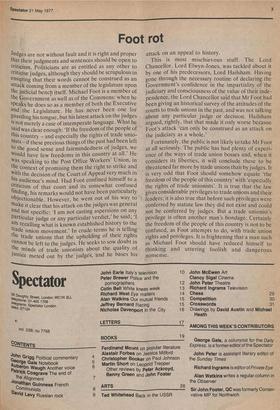Foot rot
Judges are not without fault and it is right and proper that their judgments and sentences should be open to criticism. Politicians are as entitled as any other to criticise judges, although they should be scrupulous in ensuring that their words cannot be construed as an attack coming from a member of the legislature upon the judicial bench itself. Michael Foot is a member of the Government "as well as of the Commons: when he Speaks he does so as a member of both the Executive and the Legislature. He has never been one for guarding his tongue, but his latest attack on the judges IS not merely a case of intemperate language. What he said was clear enough: `If the freedom of the people of this country — and especially the rights of trade unicinists if these precious things of the past had been left to the good sense and fairmindedness of judges, we Would have few freedoms in this country at all.' He „ was speaking to the Post Office Workers' Union, in the context of promising them the right to strike and With the decision of the Court of Appeal very much in his audience's mind. Had Foot confined himself to a criticism of that court and its somewhat confused inding, his remarks would not have been particularly objectionable. However, he went out of his way to make it clear that his attack on the judges was general and not specific: I am not casting aspersions on any Particular judge or any particular verdict,' he said; am recalling what is known established history to the trade union movement: In crude terms he is telling the trade unions that the upholding of their rights cannot be left to the judges. He seeks to sow doubt in the minds of trade unionists about the quality of Justice meted out by the judges, and he bases his attack on an appeal to history.
This is most mischievous stuff. The Lord Chancellor, Lord Elwyn-Jones, was tackled about it by one of his predecessors, Lord Hailsham. Having gone through the necessary routine of declaring the Government's confidence in the impartiality of the judiciary and consciousness of the value of their independence, the Lord Chancellor said that Mr Foot had been giving an historical survey of the attitudes of the courts to trade unions in the past, and was not talking about any particular judge or decision. Hailsham argued, rightly, that that made it only worse because Foot's attack 'can only be construed as an attack on the judiciary as a whole.'
Fortunately, the public is not likely to take Mr Foot at all seriously. The public has had plenty of experience of the ways of trade union bosses and, when it considers its liberties, it will conclude these to be threatened far more by trade unions than by judges. It is very odd that Foot should somehow equate 'the freedom of the people of this country' with 'especially the rights of trade unionists'. It is true that the law _ gives considerable privileges to trade unions and their leaders; it is also true that before such privileges were conferred by statute law they did not exist and could not be conferred by judges. But a trade unionist's privilege is often another man's bondage. Certainly the freedom of the people of this country is not to be confused, as Foot attempts to do, with trade union rights and privileges. It is frightening that a man such as Michael Foot should have reduced himself to thinking and uttering foolish and dangerous nonsense.


































 Previous page
Previous page